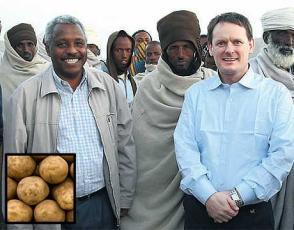Public and OECD urge government to meet aid commitment

The vast majority of Irish people believe the Irish government should spend more than it currently does on overseas development aid (ODA). A new survey shows high support for meeting Ireland's ODA commitment of 0.7% of Gross National Income (GNI), even among marginalised groups. Ireland currently contributes 0.54% of GNI in ODA. By Malachy Browne.
The findings were published today by Dochas, the umbrella group for Irish non-governmental development organisations. The survey, conducted by MRBI Ipsos, sampled 1,000 Irish people over 15 years of age.
The survey found that on average, respondents estimated Ireland's ODA spending as 9.2% of GNI, far more than the actual figure of 0.54%. It also found:
- 84% of respondents agree that even in a downturn we had an obligation to invest in ODA;
- 81% agree that it is important for Ireland's reputation to keep the promise that 0.7 % of national income should be given for ODA.
(Pictured: Overseas Aid Minister Peter Power in Ethiopia in 2009 where local farmers began to grow potatoes with the help of Irish aid)
Bertie's broken promise
A decade ago, at the UN Millenium Summit on 8 Sept 2000, then Taoiseach Bertie Ahern committed Ireland to reaching the UN target of 0.7% GNI by 2007. His government gradually increased ODA from 0.39% of GNI in 2003 to 0.58% by 2008. This equated to US$1.3 billion in aid in 2008. However, in 2005 the target date for meeting 0.7% was revised to 2012. In 2009 it was pushed out again to 2015.
Government cuts in 2009 reduced Ireland's ODA by €95 million, according to an OECD report. According to Dochas, Ireland currently gives €671m in ODA annually.
Irish aid 'effective'
The aid given by Ireland is well-regarded among other western countries and some development monitors. A 2009 OECD peer review paper published by the OECD describes Ireland as "a champion in making aid more effective". In 2006, Action Aid reported that Ireland was one of only five Development Action Committee nations to provide 'untied' aid, or aid without preconditions. Indeed, in this respect Ireland is ranked first among 22 countries on the 2009 Commitment to Development Index (CDI). The CDI ranks Ireland sixth overall, through "through its high quality foreign aid program, its lack of arms exports to undemocratic governments and its low barriers to entry for immigrants from developing countries".
However, concerns and criticisms have been leveled. The CDI also said that Ireland is "one of the lowest in government support for technology creation and dissemination [in less developed countries]." Ireland also ranked low in "keeping borders open to agricultural trade with poor countries". The OECD raised as a concern the decentralisation of the Irish Aid division of Foreign Affairs to Limerick, saying consequences should be monitored.
The OECD peer review paper urged Ireland to meet its 0.7% obligation by 2012. The Dochas report likely anticipates the possibility of further cuts to ODA in Budget 2011 which will be announced on 7 December 2010.
The complete survey results may be read in the embedded PDF below.
